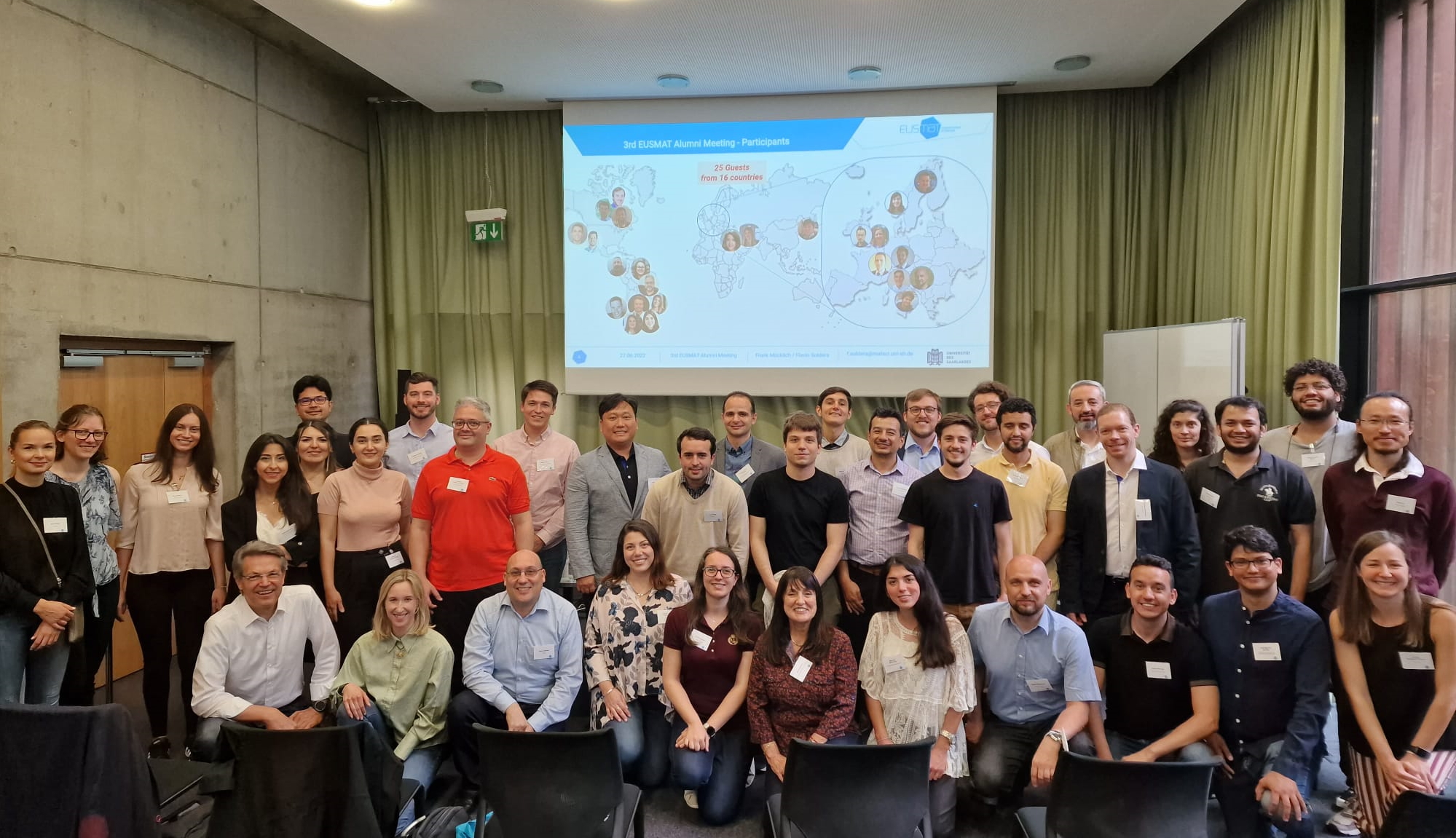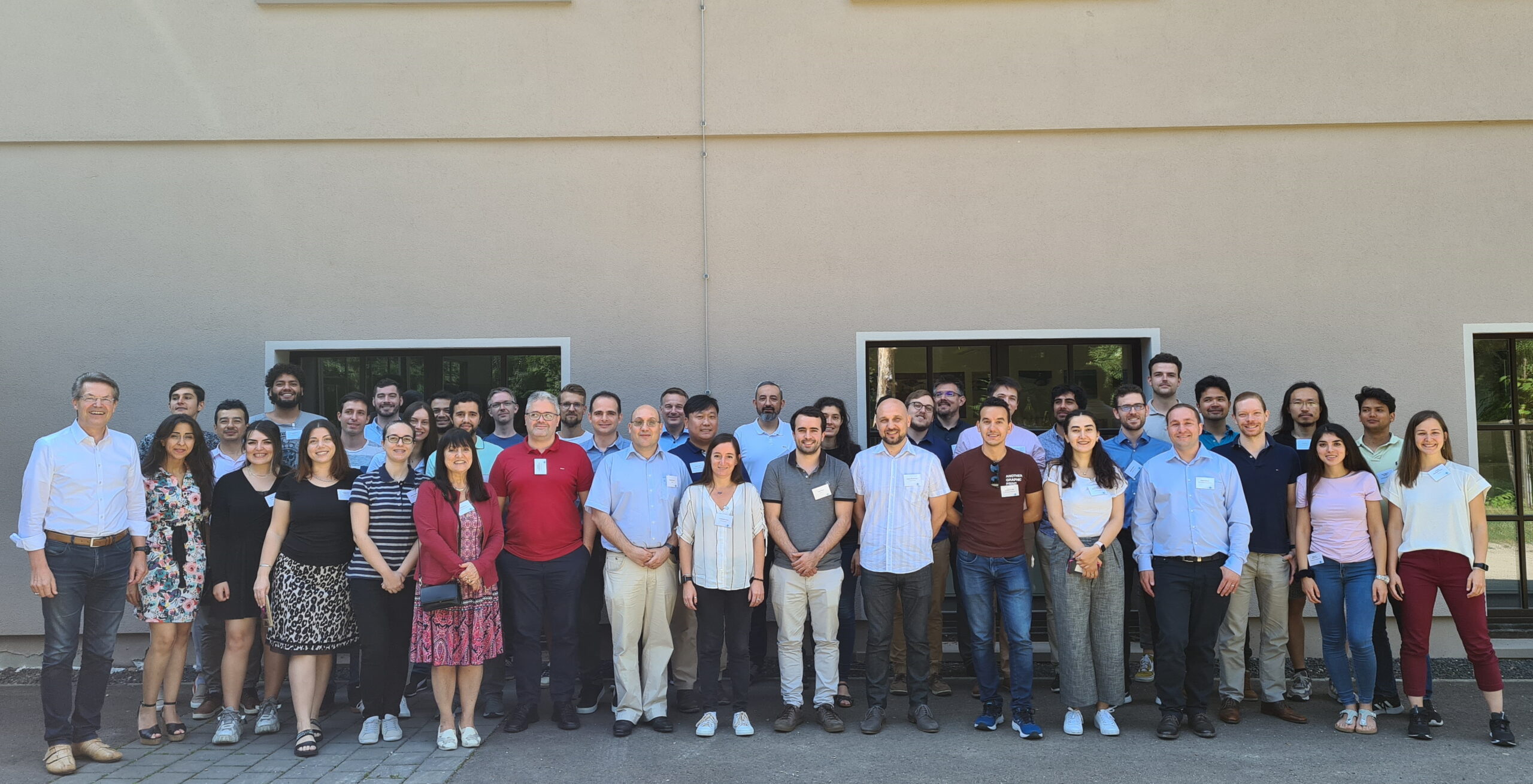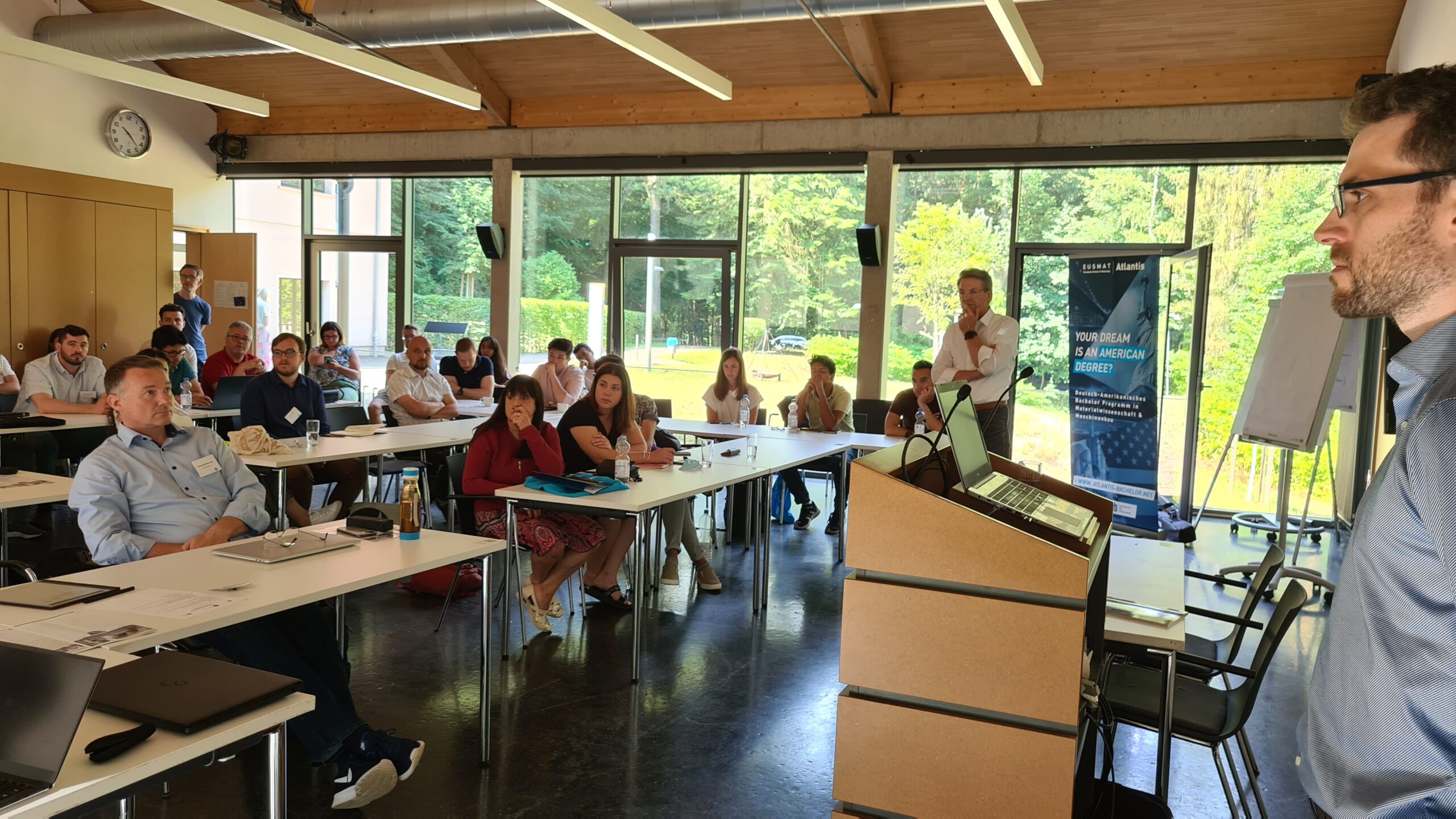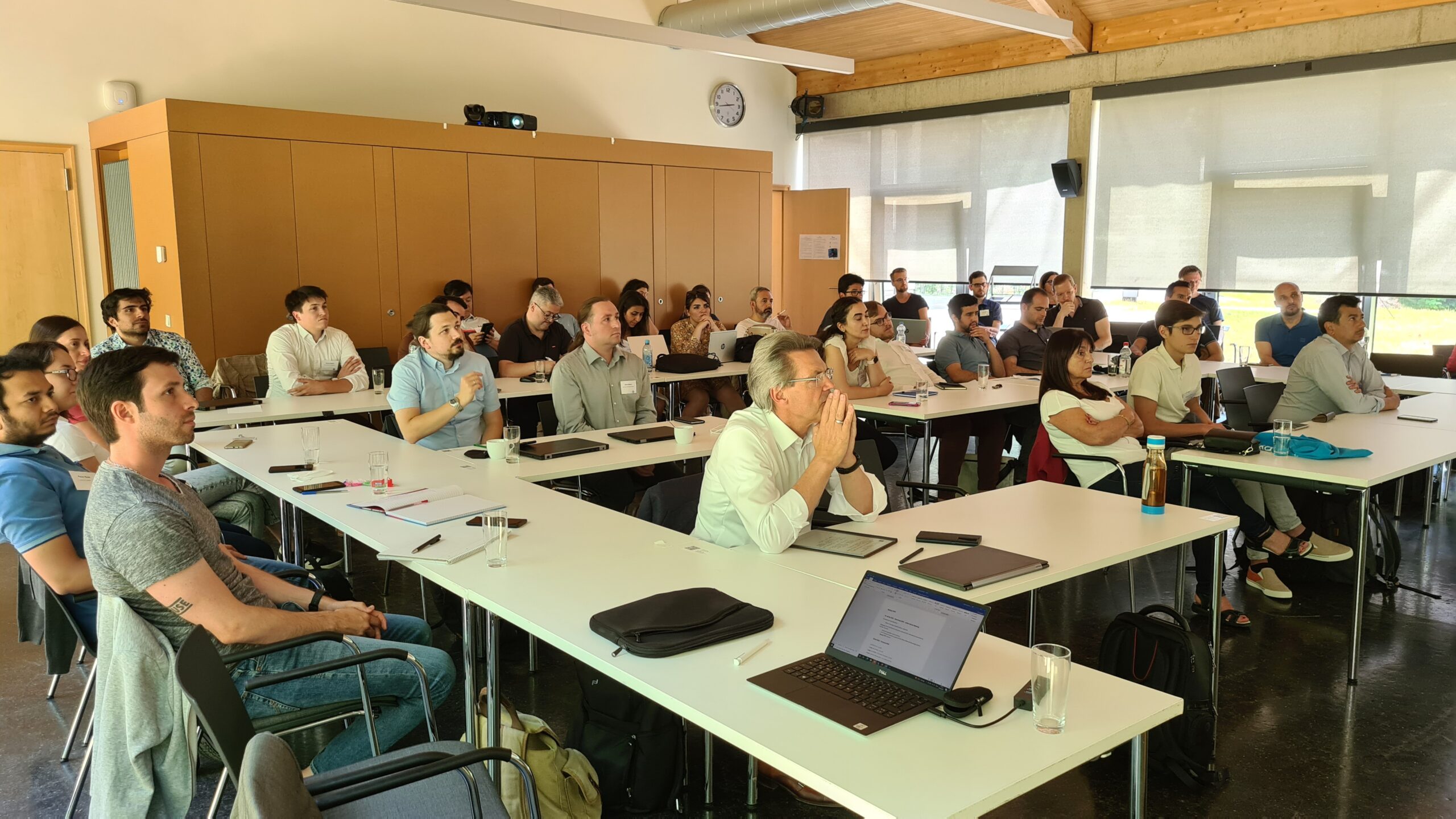3rd International Network Meeting of EUSMAT – 2022
The meeting took place from 27 June to 1 July 2022 at the Saarland University. Around 70 persons participated of the the different events, which included different meetings, excursions and workshops, including 22 Alumni that came from all over the world to Saarbrücken.
The Alumni Meetings are an important building block of EUSMAT’s lifelong learning strategy and contributes to the ongoing dialogue with former students and researchers. Additionally, we want to contribute to their professional and interdisciplinary qualification. Thus selected workshops conducted by recognized experts were offered.
Alumni Meeting – Presentations of Alumni:
Each participant introduced him/herself, reporting about his/her studies in Germany or in the EUSMAT programmes, career path and current activities.

NFDI-Workshop: Digital Transformation in Materials Science and Engineering
Digitalization in recent years has already given a groundbreaking impulse to all fields of application in the engineering sciences. This applies to the major future areas of mobility, communication, safety, health and energy – and not least the broad field of materials science and engineering. The Digital Transformation in MSE aims to improve the transparency, sustainability and, in the long term, the efficiency of research. Key components of this transformation are open platforms, standards and technologies for data processing, data exchange, and data analysis.
Invited experts participating in the German wide initiative NFDI-MatWerk (National Research Data Infrastructure for Materials Science & Engineering) presented the current situation of this process in Germany. The workshop was moderated by Frank Mücklich (Saarland University) and included the follwoing talks:
- Alexander Hartmaier (University of Bochum): “Data-oriented microstructure reconstruction and property assessment for metallic materials“
- Marius Politze (RWTH Aachen) and Niklas Siemer (Max Planck Institute for Iron Research, Düsseldorf): “Exploiting FAIR data to enhance data analysis“
- Tim Dahmen (DFKI Saarbrücken): “What is Artificial Intelligence?“
- Martin Müller (Saarland University): “Digitalization in Materials Science – Data Science and Artificial Intelligence as a foundation for materials optimization“
- Ali Riza Durmaz (Fraunhofer Institut IWM, Freiburg): “Semantic process descriptions for the production and characterization of bainitic steels“
- Tim Dahmen (DFKI Saarbrücken): “Chaldeene: Towards a Graphical Programming Language for the Processing of Microscopy Images“



Workshop on business start-ups (Dr. Nida Bajwa)
The topic of business start-ups is currently on everyone’s lips in Germany and many European countries. The creation of start-ups can promote innovation, but also generate qualified jobs in structurally weak regions. The workshop was conducted by Dr. Nida Bajwa, an expert in the field of start-up and innovation psychology from Saarland University with several years of experience running various capacity-building projects in the field of start-ups (including in Europe, East Africa and Asia). The workshop focussed on what skills and attitudes are particularly helpful for start-up projects in different countries and gave special attention to the effectuation concept that is particularly relevant at early stages of a startup. The second part of the workshop expanded to entrepreneurial ecosystems at higher education systems and how they could be supported.
The Saarland Start-up Scene
The event was organized by the European Schools Materials – EUSMAT together with the Universitätgesellschaft des Saarlandes e.V.
Start-ups and young companies with a focus on high-tech are the flagship of technological change and at the same time represent the innovation potential of a region. How can the universities together with research centers support and promote such initiatives? Where does Saarland stand in comparison with other federal states? How good are opportunities in materials science and engineering for start-ups creation?
The “Gründer-Campus Saar” is the contact point for people from the region who are interested in founding a company and start-ups. Moreover, several start-ups have been founded in the last years also from the field of materials science and engineering. These companies have joined forces within the Deep-Tech Saarland association. The above-mentioned questions were discussed in the event and the participants could learn about activities and support possibilities of the Gründer-Campus Saar. The event included the following program:
Opening Words, Prof. Frank Mücklich, EUSMAT Chairman and Universitätsgesellschaft des Saarlandes e.V.
Dr. Ralf Zastrau, Director Entrepreneurship (Saarland University): Impulse lecture: Start-up-scene and ecosystem at the Saarland University
Short presentations of start-ups of Deep-Tech Saar: Surfunction Gmbh, INNOCISE GmbH, K|Lens GmbH, AcesoMed GmbH, AMS – Amorphous Metal Solutions GmbH, and Delfa Systems GmbH
Workshop on International Research Funding (Jörg Scherer)
Research funding is an essential part of conducting research. To be able to secure a research grant is a matter of prestige for a researcher and it also helps in the advancement of career. Equally, a new, recovering or growing business needs money to fund expansion strategies. In any way, knowlegde about different types of funding sources and appropriate skills to prepare successful applications are key competences in research, innovation and business development.
The workshop provided insights in defining the best strategy to align project ideas with matching funding opportunties – followed by tips on successful proposal writing. The second part of the workshop was dedicated to elaborate on concrete project examples. Different types of projects and recommendations for project implementation were outlined and discussed.
Workshop Basics of Science Communication (Stephan van Duin)
Learn how to engage your audience effectively
This workshop helps participants to communicate better with their peers, but also with subsidy organizations, policy makers or a wider audience.
Participants learnt the basics of successful science communication, with the aim at defining the message, goal and target audience. It was shown how to really understand target audience, and to adapt the message for optimal communication with them.
www.theonlinescientist.com
Collaborative Leadership (Sophia Karlsson)
This training aimed at increasing awareness about leadership and communication, improve collaboration, and reduce tendencies for in-house competition. By different activities it was shown that great leaders know how to connect and how to communicate with their team members. This is a teachable skill and anyone can improve their ability to influence others.
Support
The event was supported by the German Academic Exchange Service (DAAD), the Erasmus Mundus programme of the European Commission and the German French University (DFH), providing full funding for 22 Alumni.





